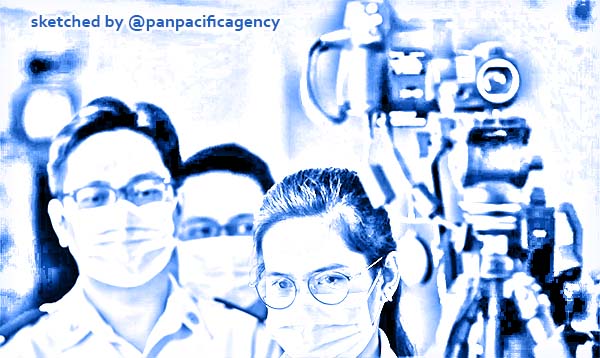Philippines reports first death outside China as Duterte orders travel ban on visitors from mainland, Hong Kong

Airport personnel monitor a thermal scanner as passengers arrive at the Ninoy Aquino International Airport in Pasay. Photo: Reuters. Sketched by the Pan Pacific Agency.
MANILA, Feb 2, 2020, SCMP. The Philippines has reported the first coronavirus death outside China, hours after a senator said the country would issue a sweeping travel ban that included Hong Kong. The victim was a 44-year-old male Chinese national, who died on February 1. He was the companion of a 38-year-old Chinese woman, who arrived in the Philippines from Wuhan on January 21 after travelling through Hong Kong, South China Morning Post reported.
Over the course of the patient’s admission, he developed severe pneumonia, the Philippines’ Department of Health said.
“This is the first reported death outside China,” Rabindra Abeyasinghe, the World Health Organisation (WHO) representative to the Philippines, said.
The announcement came hours after Philippine media reported that President Rodrigo Duterte was set to issue a temporary travel ban on visitors from China, including Hong Kong and Macau, to curb the spread of the novel coronavirus that has claimed more than 300 lives in China.
The measures would apply to all travellers from China regardless of nationality.
That travel ban announcement was made by Senator Christopher “Bong” Go, a former close aide of Duterte, in an interview aired on GMA News TV on Sunday.
“Taking into consideration the concerns raised by key government officials and health experts, the president made a decision and has agreed to adopt this recommendation and implement it immediately as additional precautionary measure to protect the Filipinos,” the senator said, according to GMA News TV.
Filipinos who were in China will have to undergo a 14-day quarantine period upon arriving in the Philippines, likely impacting many of the 240,000 Filipino workers in Hong Kong.
Eman Villanueva, a spokesman for the Asian Migrants Coordinating Body in Hong Kong, said that Filipino workers, many of them domestic helpers, would have made plans to return to home in April for Holy Week, which includes Easter. But the 14-day quarantine period would complicate those plans.
“That would mean foregoing the home leave, because it would be meaningless,” Villanueva said.
Jess Mendez, a 38-year-old Filipino domestic helper in Hong Kong, said the travel restrictions could prevent her from witnessing her 18 year-old daughter’s graduation ceremony, also in April.
“I was scheduled to go home in February for my mother’s death anniversary … I am basically deprived of going home and spending time with my family,” she said.
But she said she understands that the measure was necessary to protect the safety of Filipinos.
The discovery of the Philippines’ first coronavirus case last Thursday prompted the Department of Health secretary Francisco Duque to immediately recommend a temporary ban on all travellers from Hubei province, the epicentre of the outbreak.
But Duterte had come under pressure from doctors, politicians and members of the ethnic Chinese community to introduce a temporary ban on all travel to and from China.
The coronavirus, known to be transmitted between humans, has already spread as far afield as Japan, North America, Europe and the Middle East – prompting the WHO to declare the outbreak a global health emergency.
In China the number of cases has risen to 14,380 and the death toll was 304 on Sunday morning. Of the new cases, 1,921 were in Hubei province, the epicentre of the outbreak.
Wuhan, with a population of 11 million, has been placed on lockdown, as have many other Chinese cities.
The United States, the European Union, Russia, Australia and Singapore have banned or restricted the entry of Chinese citizens, and any foreigners that have recently visited China, to curb the spread of the virus.
New US measures include a ban on the entry of foreign nationals – other than the immediate family of US citizens and permanent residents – who have travelled in China within the last 14 days.
China’s Foreign Ministry has blasted the US government for restricting the entry of Chinese nationals.
“While the WHO has only just specifically advised against any travel restrictions, the US has decided to act in the opposite way. This has set a bad example. It is certainly not a gesture of goodwill,” ministry spokeswoman Hua Chunying said.
A Hong Kong businessman who supplies Chinese medicine to the Philippines – and travels frequently to Manila – said he was at a loss at what to do in the face of a travel ban.
“I won’t be able enter the Philippines. My business has come to a halt,” said the man, who asked not to be named.
“This is affecting my business badly. But at the same time, I think that as a president, (Duterte) did the right thing. He did so for the interests of his citizens. He is responsible for the well-being of his people.”
The Philippines is a popular destination for Chinese travellers, for both tourism and business.
China has attempted to entice the Philippines into closer security ties since Duterte became president in 2016, despite stand-offs over the South China Sea and a defence treaty with the US.
Previously Health Secretary Duque had been reticent about implementing a total travel ban. On Wednesday he had warned congressmen that if the Philippines did so “China might question why we’re not doing the same for all other countries that have reported cases of the virus. It’s very tricky”.
Additional reporting by Sum Lok-kei, Phila Siu and agencies. Sum Lok-kei joined the Post in 2018. He is a reporter on the Hong Kong desk. Phila Siu, also known as Bobby, has been a journalist since 2009. He has reported on human rights, security, politics, and society in Hong Kong, mainland China and Southeast Asia. He holds a bachelor’s degree in journalism from Hong Kong Baptist University and a human rights law master’s degree from the University of Hong Kong.